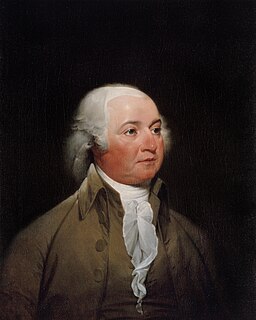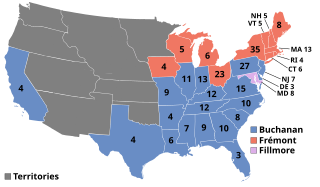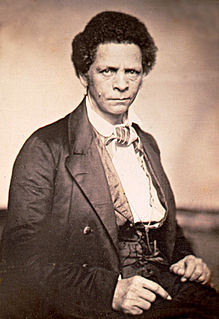
Politics of Liberia takes place in a framework of a presidential representative democratic republic modeled on the government of the United States, whereby the President is the head of state and head of government; unlike the United States, however, Liberia is a unitary state as opposed to a federation and has a pluriform multi-party system rather than the two-party system that characterizes US politics. Executive power is exercised by the government. Legislative power is vested in both the government and the two chambers of the legislature.

The United States presidential election of 1796 was the third quadrennial presidential election. It was held from Friday, November 4 to Wednesday, December 7, 1796. It was the first contested American presidential election, the first presidential election in which political parties played a dominant role, and the only presidential election in which a president and vice president were elected from opposing tickets. Incumbent Vice President John Adams of the Federalist Party defeated former Secretary of State Thomas Jefferson of the Democratic-Republican Party.

The United States presidential election of 1824 was the tenth quadrennial presidential election, held from Tuesday, October 26, to Thursday, December 2, 1824. In an election contested by four members of the Democratic-Republican Party, no candidate won a majority of the electoral vote, necessitating a contingent election in the House of Representatives under the provisions of the Twelfth Amendment to the United States Constitution. On February 9, 1825, the House of Representatives elected John Quincy Adams as president. The 1824 presidential election was the first election in which the winner of the election lost the popular vote.

The United States presidential election of 1856 was the 18th quadrennial presidential election, held on Tuesday, November 4, 1856. In a three-way election, Democrat James Buchanan defeated Republican nominee John C. Frémont and American Party nominee Millard Fillmore.

Charles Dunbar Burgess King was a politician in Liberia of Americo-Liberian and Freetown Creole descent. He was a member of the True Whig Party, which ruled the country from 1878 until 1980. He served as the 17th President of Liberia from 1920 until 1930.

The 1997 Liberian general election was held on 19 July 1997 as part of the 1996 peace agreement ending the First Liberian Civil War. The presidency, as well as all seats in the House of Representatives and the Senate were up for election. Voter turnout was around 89%. Former rebel leader Charles Taylor and his National Patriotic Party (NPP) won the election by a substantial margin; Taylor won 75.3% of the vote in the presidential election, whilst the NPP won the same number of votes in the parliamentary election. Taylor was inaugurated as president on 2 August 1997.

General elections were held in Liberia on 15 October 1985. These were the first elections since the 12 April 1980 military coup that brought Samuel Doe to power. During 1984, a new draft Constitutional referendum was approved, which allowed a 58 member civilian and military combined Interim National Assembly, headed by President Samuel Doe. The ban on political parties were lifted and four parties, namely, the President's National Democratic Party of Liberia, Liberian Action Party, Unity Party and Liberia Unification Party were in fray.

The Legislature of Liberia is the bicameral legislature of the government of Liberia. It consists of a Senate – the upper house, and a House of Representatives – the lower house, modeled after the United States Congress. Sessions are held at the Capitol Building in Monrovia. Legislature of Liberia is considered one of the three branches of government based on the Article III of the Constitution of Liberia that stipulates all three branches ought to be equal and coordinated based on the Principle of checks and balances.

The Vice President of the Republic of Liberia is the second-highest executive official in Liberia, and one of only two elected executive offices along with the President. The Vice President is elected on the same ticket with the president to a six-year term. In the event of the death, resignation or removal of the president, the Vice President ascends to the presidency, which he or she holds for the remainder of their predecessor's term. The Vice President also serves as the President of the Senate and may cast a vote in the event of a tie. The current Vice President is Jewel Taylor, serving under President George Weah. She began her term on January 22, 2018.

A referendum to amend the Constitution of Liberia was held on 23 August 2011. Voters chose whether to ratify four amendments regarding judge tenure, elections scheduling, presidential candidate requirements and the electoral system. The National Elections Commission of Liberia (NEC) oversaw the referendum.

A constitutional referendum was held in Liberia on 27 September 1847. The new constitution would create a President with executive powers and a bicameral Legislature. It would also restrict voting rights to those of African descent and landowners. It was approved by 79% of voters. In Monrovia, Millsburg, Bassa Cove and Bexley 100% of voters supported the constitution, whilst 100% voted against it in Sinoe. In Edina opponents of the constitution prevented the polling station opening, and a fist-fight broke out between Amos Herrnig and Ephraim Titler, two of the Declaration of Independence signatories. Opponents of the constitution in Bassa Cove and Bexley chose not to vote.

General elections were held in Liberia on 1 May 1951, the first to be held under universal suffrage, as previously only male descendants of Americo-Liberians had been allowed to vote. This was the first elections in Liberia where women and the local Liberians owning property were allowed to vote based on a Constitutional Referendum in 1945–46. In the presidential election, William Tubman of the True Whig Party was the only candidate, and was re-elected unopposed.
Anthony David Williams (1799-1860) was a Liberian politician who served as the Vice President of Liberia from 1850 to 1854 under President Joseph Jenkins Roberts. Born free in the United States in 1799, he immigrated as a Methodist preacher from Petersburg, Virginia to Liberia in 1823. Williams served as the Colonial Agent for the American Colonization Society from 1837 to 1839. During his tenure, the colony of Mississippi-in-Africa was established. In the 1849 elections, Williams ran for vice president against incumbent Nathaniel Brander. The failure of any candidate to secure a majority of the vote led the race to be thrown to the House of Representatives, which chose Williams as vice president. He died in 1860.

The United States elections of 1788–89 were the first federal elections in the United States since the ratification of the United States Constitution in 1788. In the elections, the George Washington was elected as the first president and the members of the 1st United States Congress were selected.
The following lists events that happened during 1849 in Liberia.

General elections were held in Liberia on 10 October 2017 to elect the President and House of Representatives. No candidate won a majority in the first round of the presidential vote, so the top two finishers — CDC standard-bearer Amb. George Weah and UP standard-bearer Vice President Joseph Boakai — competed in a run-off on 26 December. The second round was originally scheduled for 7 November, but was postponed after LP standard-bearer Cllr. Charles Brumskine, in third place, challenged the result in the Supreme Court. The Supreme Court dismissed the challenge, which would have forced a re-run of the first round had it been successful, and the second round was held on 26 December. Weah emerged victorious with just over 60% of the vote.

Legislative elections were held in Liberia on 1 December 1840.














